CHAPTER FOUR
Karmic Retribution of Living Beings
________________________________________
Sutra:
At that time Earth Store Bodhisattva said to the Buddha, “World-Honored One, because I have received the awesome spiritual power of the Buddha, the Thus Come One, I reduplicate my body and rescue living beings from their karmic retributions everywhere, throughout hundreds of thousands of millions of worlds. If it were not for the great compassionate strength of the Thus Come One, I would be unable to perform such changes and transformations. Now, I receive the World-Honored One’s entrustment; until the coming of Ajita, I will cause all living beings in the Six Paths to attain liberation. So it is, World-Honored One, do not be concerned.”
Commentary:
Earth Store Bodhisattva does not brag, “I have great spiritual penetrations, far-reaching wisdom, and charismatic eloquence.” Instead, he says humbly that because he has received the Buddha’s power, he is able to reduplicate his body and rescue living beings who have doubts, commit karma, and undergo subsequent retributions. The process by which the reduplicated bodies which did not formerly exist come into being is called “transformation.”
Ajita is another name of the Bodhisattva Maitreya, and it means both “invincible” and “the kind one.” Since there is none who can overcome him, he can be victorious over all, and since he cannot be defeated, he constantly laughs and is never angry. It is from these qualities that his wisdom comes.
Sutra:
The Buddha then told Earth Store Bodhisattva, “Living beings who have not yet obtained liberation have unfixed natures and consciousness. They may practice evil or good and reap the corresponding karma. Their good or evil acts arise in accordance with their states, and they turn in the Five Paths without a moment’s rest. They pass through kalpas as numerous as motes of dust, confused, deluded, obstructed, and afflicted by difficulties, like fish swimming down a long stream through nets. They may slip about through the nets for a long time, but, after temporary liberation, they again are snagged. It is for such as these that I would be concerned, but since you have made extensive vows and sworn to cross over such offenders throughout many kalpas, I have no cause for worry.”
Commentary:
People who have unfixed natures and consciousness have no determined resolve. First they decide to study the Buddhadharma and then they change their minds. Their good or evil acts arise in accordance with their states. If they encounter a healthy environment, good friends who explain Dharma and teach them to benefit others, they continue their study. If they meet bad friends who lead them into debauchery, they follow along and their good acts cease.
The same process of influences is at work everywhere. If you are always with energetic people, little by little you too become vigorous. If you associate with lazy people, even though you may be energetic by nature, you become lazy too. This is what is meant by the proverb, “Be near rouge and turn red, be near ink and turn black.” Things take on the color to which they are exposed. Dye cloth tan and it becomes tan; put it in yellow dye and it turns yellow. If you become friends with drinkers, you unsuspectingly become one of them; if you run with people who take drugs, you end up like them. We should always be cautious in choosing our friends, since it is their advice to which we listen most. If your friends are good ones, you should listen to them, but if they are bad, they should be ignored.
The Five Paths are the hells, hungry ghosts, animals, humans, and gods. While it is common to refer to the Six Paths, they may also be reckoned as five, since asuras appear in all paths. Living beings turn in the paths like fish swimming down a long stream through nets. The analogies in the Buddhist sutras certainly are fitting.
Sutra:
When this was said, a Bodhisattva, Mahasattva, named Samadhi Self-Existent King arose from the midst of the assembly and said to the Buddha, “World-Honored One, what vows has Earth Store Bodhisattva made during these many kalpas that he now receives the World-Honored One’s special praise? Please, World-Honored One, speak about this.”
The World-Honored One said to Samadhi Self-Existent King, “Listen attentively, consider this well. I shall now explain this matter for you.”
Commentary:
A Mahasattva is a great being. Because he cultivated samadhi and attained a self-contained existence, this Bodhisattva is called Samadhi Self-Existent King.
Sutra:
“Once, limitless asamkhyeyas of nayutas of kalpas ago, there was a Buddha named All-Knowledge-Accomplished Thus Come One, the One Worthy of Offerings, the One of Right and Equal Enlightenment, the One Perfect in Clarity and Conduct, the Well-Gone-Forth One, the Unsurpassed Scholar Who Comprehends the World, the Valiant Tamer and Guide, the Master of Gods and Men, the Buddha, the World-Honored One. That Buddha’s lifespan was sixty thousand kalpas. Before leaving home he had been the king of a small country and had been friendly with the king of a neighboring country with whom he practiced the Ten Good Deeds and benefited living beings. Because the citizens of these countries did many evil acts, the kings agreed to perfect expedient devices for them. One vowed, ‘I will accomplish the Buddha Way quickly and then cross over all the others without exception.”
“The other king vowed, ‘If I do not first cross over all those who suffer for their offenses, and cause them to attain peace and Bodhi, I shall not accomplish Buddhahood.’”
The Buddha told the Bodhisattva Samadhi Self-Existent King, “The King who vowed to become a Buddha quickly is All-Knowing-Accomplished Thus Come One. The king who vowed not to become a Buddha until he had seen all others safely across is Earth Store Bodhisattva.”
Commentary:
Asamkhyeya and nayuta are the names of very large numbers that describe the time when All-Knowledge-Accomplished Thus Come One appeared in the world. There are Three Kinds of Knowledge:
1. All Knowledge
2. Knowledge of the Way
3. Knowledge of All Modes
The third of these encompasses the other two.
The sutra text describes this Buddha by means of the Ten Designations of the Buddha. The first is Thus Come One. A layman once asked me if Amitabha Buddha and Thus Come One Buddha were different. You should know that all Buddhas are called Thus Come One. There is Amitabha Thus Come One, Sakyamuni Thus come One, Medicine Master Thus Come One, and so forth. This use of names is similar to that found among people. Everyone has his own personal name, which may be used by his peers or by those above him who know him well, but most people also have a title by which they are known to people with whom they are only distantly acquainted. Each of the Ten Designations of the Buddha has its own descriptive title. The designation Thus Come One, for example, has the title “Identity with the Former Virtuous Ones.”
As for the meaning of the term “Thus Come One,” “Thus” is placeless and without direction, and “Come” is a response and manifestation. “Come,” therefore, can be explained as not coming from anywhere, and “Thus” as not going anywhere. The meaning of all this is that nothing comes and nothing goes. Furthermore, “Thus” is the principle of fundamental enlightenment, and “Come” is the wisdom of initial enlightenment which arises in reliance on the principle of fundamental enlightenment.
The One Worthy of Offerings. In this phrase the word “worthy” means deserving. That is to say, since he merits the offerings of men and gods, men and gods should make offerings to him. This designation, like all the others, has its particular title, “Capable of Being a Field of Merit.” There are two kinds of merit fields. The first is that of self-benefit and the second that of benefiting others. To benefit oneself means to investigate truth and eliminate doubts. It is called self-benefit, since he who investigates is the one who understands. Others, however, must be taught so they may learn to do the same work. This teaching is the benefiting of others.
The One of Right and Equal Enlightenment. Right is distinguished from the wrong of outside ways. Equal is distinguished from the nonequality of the Two Vehicles, which only attain to an extreme of the emptiness principle and do not see the equality of emptiness and existence. One with enlightenment is distinguished from those who are unenlightened. The designation as a whole means that there is nothing that is not known, and this designation also has its own title, “Universal Knowledge of the Dharma Realm.”
The Surangama Sutra says, “The straightness of the pine, the twining of the bramble, the whiteness of the egret, and the blackness of the crow are fully understood in their original existence.” The Buddha knows the reasons for all phenomena, just as he knows every drop of rain that falls, even those outside the Three Thousand Great Thousand Worlds.
The One Perfect in Clarity and Conduct. Clarity means understanding and conduct means cultivation. Clarity is wisdom; conduct is blessings. This refers to the double perfection of the Buddha’s wisdom and blessings. There are Three Kinds of Clarity:
1. Clarity of the Heavenly Eye
2. Clarity of Past Lives
3. Clarity of Exhaustion of Outflows
The title of this designation is the “Display of Causal Virtues in the Result,” because it is on the ground of results that the virtuous conduct cultivated on the ground of cause is made manifest.
The Well-Gone-Forth One. The title of this designation is “Wonderfully Gone to Bodhi.” This title derives from the Buddha’s ability to go into all Buddha-lands of the Ten Directions and use expedient devices and provisional teachings to transform living beings.
The Unsurpassed Scholar Who Comprehends the World. If one has doubts of any sort he can still be surpassed. Because the Buddha has cut off all doubts – those of views, those of thought, and those as fine as dust and sand – he is an unsurpassed scholar. Because he knows that both the body and exterior states are empty and false, and that only the Buddha vehicle is genuine, this designation has the title, “Penetrating through the Counterfeit and Reaching the Truth.”
The Valiant tamer and Guide. The Buddha regulates living beings in the Six Paths and guides them toward the result of Buddhahood. Because he guides living beings from the turning wheel of birth and death, this designation has the title, “Collecting and Teaching Beings in Accordance with the Way.”
The Master of Gods and Men. He is a model for the triple world with all its gods and men. The title of this designation is “Speaking Dharma in Response to the Opportunities of Beings.”
The Buddha. The title of this designation is “Fully Bright in the Three Enlightenments.” The Three Enlightenments are:
1. The Enlightenment of Self
2. The Enlightenment of Others
3. The Completion of Enlightenment and Conduct
The World-Honored One. Because he is honored both in and beyond the world, he has this designation, whose special title is “The Only Revered One of the Triple World.” The Triple World is:
1. The realm of desire
2. The realm of form
3. The formless realm
When Sakyamuni Buddha was born, he pointed one hand at heaven and the other at earth, took seven steps, and said, “In the heavens above and here below, I alone am honored.” Thus he has this title. There are six additional meanings to the honorific “World-Honored One”:
1. Self-Existent
2. Blazing
3. Upright and Majestic
4. Universally Renowned
5. Auspicious
6. Venerable and Honorable
The Ten Good Deeds practiced by the kings of the two small countries are abstention from:
1. Killing
2. Lying
3. Sexual misconduct
4. Greed
5. Hatred
6. Stupidity
7. Bad speech
8. False speech
9. Double-tongued speech
10. Idle talk
Sutra:
“Moreover, limitless asamkhyeya kalpas ago a Buddha named Pure-Lotus-Eyes Thus Come One appeared in the world. His lifespan was forty kalpas. During his Dharma-Image Period, an Arhat who had great merit and who crossed over living beings, teaching them as he encountered them, met a woman named Bright Eyes who made an offering of food to him.
“‘What is your wish?’ asked the Arhat.
“Bright Eyes replied, ‘On the day of my mother’s death I performed meritorious deeds for her rescue, but I do not yet know in what path she has been born.’
“Out of pity for her, the Arhat entered into samadhi to contemplate, and saw that Bright Eyes’ mother had fallen into an evil path where she was undergoing extremely great suffering. The Arhat asked, ‘When your mother was alive, what deeds did she do that she should now be undergoing such great punishment in an evil path?’
“Bright Eyes replied, ‘My mother enjoyed eating fish, turtles, and the like. She particularly relished their fried or boiled roe, and because she was fond of eating, she took thousands of lives. Oh, Venerable Compassionate One, how can she be saved?’
“The Arhat pitied her and established an expedient device and said, ‘With a sincere will be mindful of Pure-Lotus-Eyes Thus Come One, and also make carved and painted images for the benefit of the living and the dead.’
“On hearing this, Bright Eyes renounced everything she loved, drew an image of that Buddha, and made offerings before it. Moreover, she wept sorrowfully as she respectfully gazed at and worshiped that Buddha. Suddenly, in the small hours of the night, as if in a dream, she saw that Buddha’s body, dazzling gold in color and as large as Mount Sumeru, emitting great light.
“This Buddha said to Bright Eyes, ‘Before long your mother will be born in your own household and as soon as she can know hunger and cold she will speak.’
“Shortly thereafter, a maidservant in the house bore a son who spoke within three days of his birth. Lowering his head and weeping mournfully, he said, ‘In life and death one must undergo retributions for his own deeds. I am your mother and have been in darkness for a long time. Since leaving you I have constantly been reborn in the great hells. As a result of receiving the power of your meritorious deeds, I have been able to be reborn, but only as a poor son of low class. My lifespan, moreover, will be short, and after thirteen years I will fall into an evil path again. Do you have some way to affect my liberation?’ “
Commentary:
The Arhat sat in dhyana and investigated the plight of Bright Eyes’ mother. His investigation involved an act of volition for its accomplishment, whereas Bodhisattvas are able to use their spiritual penetrations at any time, anywhere, and need not deliberately make an effort to meditate and enter samadhi.
Bright Eyes renounced everything she loved, drew an image of that Buddha, and made offerings before it. Just as the Brahman woman sold her house, Bright Eyes gave away and sold her most cherished possessions for the sake of performing an offering of incense, flowers, ointments, fruits, food and drink, clothing, bedding, and medicinal herbs before the Buddha Pure-Lotus-Eyes. Later the Buddha appeared to her as if in a dream; because of her extreme sincerity and earnestness, there was what is called an “intertwined response with the Way,” and she saw the Buddha’s body.
Sutra:
“When Bright Eyes heard the words of the servant’s child, she knew without doubt that he was her mother and, choked with sobs, said to the child, ‘Since you are my mother you should know your own past offenses. What deeds did you do that caused you to fall into the Evil Paths?”
“The servant’s child said, ‘I have undergone this retribution as a result of killing and slandering. If I had not received the merit which you earned to rescue me from difficulty, my karma would be such that I could not yet have been released.’
“On hearing this, Bright Eyes asked, ‘What happens during retribution in the hells?”
“The servant’s son answered, ‘Merely to speak of those sufferings is unbearable, and even a hundred thousand years would not suffice to describe them all.’
“Bright Eyes heard this and wept bitterly and said into empty space, ‘May my mother be eternally separated from the hells, and after these thirteen years may she be free of her heavy offenses and leave the Evil Paths. O Buddha of the Ten Directions have compassion and pity me. Hear the far-reaching vows which I am making for the sake of my mother. If she can leave the Three Evil Paths forever, leave the lower classes, leave the body of a woman, and never again have to endure them, then, before the image of the Thus Come One Pure-Lotus-Eyes, I vow that from this day forth, throughout hundreds of thousands of tens of thousands of millions of kalpas, I will rescue living beings who are suffering in the hells for their offenses, and others of the Three Evil Paths. I will rescue them all and cause them to leave the realm of the hells, hungry ghosts, animals, and the like. Only when the beings who are undergoing retribution for their offenses have all become Buddhas will I myself accomplish the right enlightenment.’
“After making this vow she clearly heard the Thus Come One Pure-Lotus-Eyes say to her, ‘Bright Eyes, you have great compassion to be able to make such a great vow for your mother’s sake. I see that your mother will cast off this body after thirteen years and will be born a Brahman with a lifespan of one hundred years. After that life she will be born with a lifespan of kalpas in the Land of No Concern, after which she will accomplish Buddhahood and cross over as many men and gods as there are sand grains in the Ganges.’ “
Sakyamuni Buddha told Samadhi Self-Existent King, “The Arhat with great merit who helped Bright Eyes is now Inexhaustible-Intention Bodhisattva, the mother of Bright Eyes is Liberation Bodhisattva, and Bright Eyes herself is now Earth Store Bodhisattva. Throughout many aeons, because of his compassionate pity, he has made as many vows as there are sand grains in the Ganges to rescue living beings.
“Men and women in the future who do not practice good but do evil, who do not believe in cause and effect, who indulge in sexual misconduct and false speech, who practice double-tongued and harsh speech, and who slander the Great Vehicle, will certainly fall into the Evil Paths. But if they encounter a good, knowing adviser who, in the flick of a finger, leads them to take refuge with Earth Store Bodhisattva, those living beings will obtain release from the retribution of the Three Evil Paths. Those whose acts show deference; who are respectful with a determined mind; who gaze in worship, praise, and make offering of flowers, incense, clothing, gems, or food and drink will be born in the heavens. There they will enjoy supremely wonderful bliss for hundreds of thousands of kalpas. When their heavenly merit is ended and they are born below in the world of men, they will be imperial kings throughout hundreds of thousands of kalpas and will be capable of remembering the causes and results of their former lives. O, Samadhi Self-Existent King, Earth Store Bodhisattva has inconceivable and ineffable great spiritual power to benefit living beings. All you Bodhisattvas should recall this sutra and proclaim and widely spread it.”
Samadhi Self-Existent King said to the Buddha, “World-Honored One, please do not be concerned. We thousands of tens of thousands of millions of Bodhisattvas, Mahasattvas, receiving the Buddha’s awesome spirit, will certainly proclaim this sutra widely throughout Jambudvipa for the benefit of living beings.”
Having spoken thus to the Buddha, the Bodhisattva Samadhi Self-Existent King put his palms together respectfully, bowed, and withdrew.
Commentary;
Some of you may think that the study of Dharma is uncomfortable. What do you think it would be like in the hells? Although you might scream that you did not want to endure such misery, you would have no way to escape, for if the effect of your offenses is not yet extinguished, there is simply no way out. Even if you undergo a little pain in the human realm, just think how much less painful it is than being in the hells. With this attitude, no matter how badly your legs hurt when you meditate, you will always be happy and will know no suffering.
You see, as the Brahman woman on the causal ground, even Earth Store Bodhisattva was helpless and could only weep to the Buddha to save her mother from the paths of knives, of blood, and of fire, as well as those of the Three States of Woe. Now, in turn, you should all be aware that if it were not for the great vows of Earth Store Bodhisattva, we might very well be undergoing retributions in the hells, tormented among the hungry ghosts, or suffering among the animals. The reason that we have become humans is that Earth Store Bodhisattva made vows to rescue us. Since we have not yet achieved the penetration of past lives, however, we do not realize the good fortune we have derived from him, how much merciful and compassionate aid we have received. If he had not made his vows, we would all be in great danger. Consequently, we should always remember to repay his kindness. Ultimately, like Bright Eyes’ mother, we can be born in the Land of No Concern, which is the Western Paradise, the Land of Ultimate Bliss.
Recently, when I lectured at the University of California, a student asked if Buddhists believed in cause and effect, I replied, “It is not a matter of belief or disbelief. If you believe in it, then there is such a thing as cause and effect; if you do not believe in it, cause and effect operate just the same. For example, go punch someone; you will certainly get hit back. Your initial punch is the cause, and your being beaten in return is an effect. Now, do you believe the principle that when you hit someone you will be hit in return?”
The student was speechless, even though he probably had a store of theories demonstrating the nonexistence of causal relationships. Perhaps he was afraid of being beaten up, or maybe he simply did not want to attack people, but in any case that was the end of that. Of course, you all know that you should not go around hitting people. If you do, you are planting a cause and you are going to get clobbered. That is an effect.
If you are not good to others, they will not be good to you. If you plant good seeds, you will reap good fruits. If you have bad friends, you will become a bad friend yourself, and if you have good friend, you will become like them. The principle of cause and effect applies everywhere. You needn’t look around to see why people are not good to you; just ask yourself, “Am I good to them?” Always turn your light back and look inward. Do not be like a camera, which can only take pictures of other people and cannot know what its own interior looks like.
One who is given to double-tongued speech presents one face to one person and another face to another. You praise A to his face and speak with him of B’s faults. When with B you speak ill of A. In this way you may cause separations and schisms, and so this offense includes one of the gravest offenses, breaking up the harmonious Sangha.
What is meant by breaking up the harmonious Sangha? The Buddhadharma is studied with bhiksus and sramaneras, and one who studies Buddhadharma cannot study on the one hand and, on the other, slander those with whom he studies. Laymen may not speak of the faults of those who have received the bhiksu or sramana precepts. This holds true for bhiksunis, too, of course. One may not destroy or cause dissension in the Sangha, saying to one person who has left home, for example, that another one has this or that fault. This kind of activity sows the seeds of dissension and causes the harmonious Sangha to disperse. To do this is to commit one of the five grave offenses discussed earlier.
Not only the Sangha; one may also not slander the Great Vehicle. One may say there is no such thing as the Mahayana, and that only the Pali Canon may be believed. The other day, for example, an insane man came here, and when he saw us studying sutras in Chinese, he asked if it had been taken from Pali. He didn’t even know what Pali was, let alone understand the question of authenticity.
What is meant by good, knowing adviser? The word good in this title may be explained as able, because a good, knowing adviser is capable of knowledge; that is, he is capable of knowing, without any obstruction whatever, that the triple world is like a burning house. There are three kinds of good, knowing advisers:
1. outward protectors
2. fellow cultivators
3. teachers
The first are those who supply the things necessary to support the Triple Jewel, and they act as Dharma protectors. The second, fellow cultivators help find and correct each other’s flaws. Since one may not know his own shortcomings, his fellow cultivators can help point them out. This does not mean, however, that they pick on and anger one another. Far from it. The idea behind this kind of relationship is mutual aid.
There is a bit of shop talk among lapidaries that says, “Slice, rub, and polish.” To render a piece of rough jade into a beautiful gem, you must first slice it open; then you must grind away all the flaws and polish it. A similar process of self-cultivation is what is being described here.
What is a teaching good, knowing adviser? He is one who instructs beings in the Buddhadharma, who lectures on sutras and speaks Dharma in order to teach them.
A flick of a finger lasts for sixty-four ksanas, each of which in turn lasts for the space of twenty blinks of an eye and contains nine hundred births and deaths. Each of these twenty blinks is twenty thoughts long. If one can encounter Earth Store Bodhisattva, and in the flick of a finger he can return to and rely upon this Bodhisattva, offering up his life and conduct, he will completely eradicate limitless offenses meriting the states of woe.
All you Bodhisattvas should recall this sutra and proclaim and widely spread it. The reason we now have a chance to see and study this sutra is that all those Bodhisattvas have been proclaiming and spreading it. If it were not for them, we would have no way to encounter this rare Dharma jewel.
Sutra:
At that time the Four Heavenly Kings arose from their seats, put their palms together respectfully, and said to the Buddha, “World-Honored One, since Earth Store Bodhisattva has made such extensive vows for kalpas, why then has he not yet completed his crossing over of beings? Why does he continue to practice such vast vows? Please, World-Honored One, explain this for us.”
The Buddha told the Four Heavenly Kings, “Excellent, excellent. For your benefit as well as for the benefit of men and gods of the present and future, I will speak of Earth Store Bodhisattva’s words in the paths of birth and death in Jambudvipa in the Saha world. I shall speak of his expedient devices, and of his compassion and pity in rescuing, saving, crossing over, and liberating beings who are suffering for their offenses.”
The Four Heavenly Kings replied, “Yes, World-Honored One, we would like to hear about his work.”
The Buddha told the Four Heavenly Kings, “From kalpas long ago until the present, Earth Store Bodhisattva has crossed over and liberated living beings, yet out of compassionate pity for those beings still suffering in the world, he has not yet completed his vows. Moreover, he sees that their causes for limitless kalpas in the future are like uncut tendrils and vines, and, because of this, he makes his mighty vows. Thus, in the continent of Jambudvipa, in the Saha world, this Bodhisattva teaches and transforms beings by means of thousands of tens of thousands of myriads of expedient devices.
“Kings, to killers Earth Store Bodhisattva speaks of a retribution of a short lifespan; to robbers he speaks of a retribution of poverty and acute suffering; to practicers of sexual misconduct he speaks of the retribution of being born as pigeons, mandarin drakes and ducks; to the foul-mouthed he speaks of the retribution of a quarreling family.
“To slanderers he speaks of the retribution of a tongueless and cankerous mouth; to the hateful he speaks of being ugly and crippled; to the stingy he speaks of frustrated desires; to gluttons he speaks of the retribution of sickness, hunger, and thirst; to those who enjoy hunting, he speaks of the retribution of a frightening insanity and disastrous doom.”
“To cruel parents or step-parents he speaks of the retribution of being flogged in future lives; to those who net and trap young animals, he speaks of the retribution of separation of flesh from bone; to those who slander the Triple Jewel, he speaks of the retribution of being blind, deaf, or mute; to those who slight the Dharma and regard the teachings with arrogance, he speaks of being in the Evil Paths forever; to those who recklessly use the things of the permanently dwelling, he speaks of the retribution of revolving in the hells for myriads of kalpas; to those who defile the pure conduct of others and purposely slander the Sangha, he speaks of an eternity in the animal realm; to those who scald, burn, behead, cut, or otherwise harm animals, he speaks of repayment in kind.
“Those who violate precepts and the regulations of pure eating, he speaks of the retribution of being born as birds and beasts suffering from hunger and thirst; to those who make unprincipled and destructive use of things, he speaks of the retribution of never obtaining what they seek; to those who are arrogant and haughty, he speaks of a retribution of being servile and of low class; to those whose double-tongued behavior causes dissension and disorder, he speaks of a retribution of tongueless ness and speech impediments; to those of biased views, he speaks of rebirth in the frontier regions.
“This is a general description of the hundreds of thousands of differing retributions resulting from the habitual bad deeds of body, mouth, and mind committed by the living beings of Jambudvipa. Since they have such differing responses, Earth Store Bodhisattva uses hundreds of thousands of expedient means to teach them. The living beings who commit offenses must first undergo retributions of such as these, and then fall into the hells, where they pass through kalpas with no moment of escape. You should therefore protect people and protect their countries. Do not allow living beings to be confused by these manifold deeds.”
On hearing this the Four Heavenly Kings wept sorrowfully, placed their palms together, and withdrew.
Commentary:
The Four Heavenly Kings of the four directions live halfway up Mount Sumeru in palaces forty-two thousand yojanas high, made of the Seven Precious Things: gold, silver, lapis lazuli, crystal, mother-of-pearl, red pearls, and carnelian. Their palaces are adorned with tiers of railings, seven layers of netting, and seven rows of trees.
The king of the east, Dhrtarastra, “he who upholds his country,” has ninety-nine sons, all of whom are named Indra. He commands two groups of ghosts and spirits, fragrant spirits and malodorous spirits.
The fragrant spirits are gandharvas, musicians who are also called doubtful spirits because, although they look like humans, they have a single horn in their foreheads. When people see them, they are unsure about whether the spirits are human. Gandharvas are extremely fond of incense and will flock to places where it is burned. The Jade Emperor, the chief of the Indras, has a very rare and wonderful sandalwood which he burns to attract them. When they arrive, he has them play music for him, since he is still caught up in the realm of defiling objects and enjoys hearing music.
The malodorous ghosts, Budana, are called Pa Ta No in the Surangama Mantra. Wherever they go they are followed by a putrid stench. Both of these groups of ghosts and spirits are under the jurisdiction of the king of the east.
The king of the south is called Virudhaka, “increasing and growing,” because he is able to lengthen and increase the good roots of living beings. He too has ninety-nine sons, all of whom are named Indra. In fact, each of the four kings has ninety-nine sons, all with the same name, so that there are three hundred and ninety-six Indras in all.
Virudhaka also watches over two groups of ghosts and spirits, one of the kumbhandas and the other the Pretas. The Kumbhandas called “distant’ ghosts because they like to stay far away from people, are also known as barrel ghosts or melon ghosts because of their shape. Pretas are called “proximate” ghosts because they like to be near people, and, in fact, they establish themselves as ancestral spirits at the memorial plaques people set up for their deceased relatives.
The king of the west is named Virupaksa, “many languages,” because he can speak the tongues of all countries; he is also called Broad Eyes. He, like the other kings, is responsible for two groups of ghosts and spirits, the Pisaci and poison dragons. The Pisaci, called Pi Sha She in the Surangama Mantra, are also called madness ghosts because they can cause incurable insanity in people. They subsist on essential energies, particularly those of humans, and always flock to places where sexual activities are producing these substances. The other group under jurisdiction of this king is the poison dragons, whose poison may be contracted by seeing, hearing, smelling, or even just being near them.
The king of the south, Vaisravana, “widely learned,” is the leader of the Four Heavenly Kings. It is in his palace that their meetings are convened. The two groups of ghosts and spirits under his command are the Yaksas and the Raksas. There are several categories of Yaksas, those who live on the ground, those in space, and those who abide in the heavens. Because Yaksas travel at more or less the speed of light, they are called speedy ghosts. Raksas, “fearsome ghosts,” are so called because of their terrifying appearance.
The Buddha told the Four Heavenly Kings that Earth Store Bodhisattva sees all the causes and conditions of living beings. The power of our deeds is like the tendrils that grow on plants and grasses, getting longer year after year. We commit deeds in one life and then in the next life we commit more, building up our karma. This continues life after life and the offense karma becomes heavier, while the merit we have acquired becomes light and lighter. With only slight meritorious virtue, you cannot become a Buddha, but if your karmic obstacles are extremely heavy, you can become a ghost.
People of little understanding say that there are no such things as ghosts. Their argument is not up to the level of a child’s. Children, at least, will usually believe an explanation that is principled, whereas people who oppose belief in ghosts and spirits usually do so without paying attention to the principles involved. If there were no ghosts, there could be no Buddhas, since the difference between the two is just a turn. If the turn is made, you are a Buddha; if not, you are a ghost. Humans are in the midst of the turning, and, consequently, if their karma becomes heavier, it is very easy for them to fall into the realms of the ghosts.
In this passage of text the Buddha describes for the Four Heavenly Kings the expedient devices used by Earth Store Bodhisattva.
To robbers he speaks of a retribution of poverty and acute suffering. Stealing includes not only actual theft but also the use of people’s property without their knowledge or permission. When Earth Store Bodhisattva meets people who commit this kind of offense, he tells them of the retribution of poverty. The reason there are so many poor people in the world is that there have been many who have stolen in past lives who are now undergoing the appropriate retribution. The more one steals, the poorer he will be, and the more he will have cause to fear one of the most bitter of all kinds of suffering, that of poverty.
Sexual misconduct refers to adultery and all manner of extramarital affairs. One should not misconstrue this, however, and say that since one is married there is no problem and one can be totally unrestrained in his sexual activity with his wife. Even married couples had best decrease this activity because it leads to dullness. The more one is involved in sexual matters, the less light he has. One has light and manifests wisdom if he does not engage in sex.
The pigeon is thought to be the most lustful bird of all and can raise an amazing number of fledglings every year. Most animals and birds mate with the male above and the female below, but the pigeon is so lustful that he reverses these positions.
The emotional attachment of mandarin drakes and ducks to their mates is extremely strong, and they are absolutely inseparable, not only in the water and on land but even in the air. Although birds may seem to have independence of a sort, they are by no means free, and theirs is certainly not a good state to be in. For those who engage in sexual misconduct, the retribution of the bird realm is a likely one, and so Earth Store Bodhisattva speaks of it to such people.
He tells those who scold, slander, lie, and speak falsely and harshly that they will always be surrounded by strife and never know peace. Those who like to prattle and talk confusedly, who slander the Triple Jewel, will be mutes or stutterers in the future. This is also the reason people sometimes develop incurable canker sores in their mouths.
To the hateful he speaks of a retribution of being ugly and crippled. This retribution is spoken of to people whose natures are like those of asuras, whose tempers flare up at the slightest provocation. When people get angry their faces turn purple and their eyes bulge, their veins stand out, and they become quite repulsive. If you like to get angry now, you face the retribution of ugliness.
The Chinese term that refers to the retribution of being crippled actually alludes to a peculiar inability to pass water. If you always get angry, in future lives you will not only be ugly, you will also be plagued by myriad illnesses.
There are some people, gluttons, who eat and drink nonstop from morning until night. After they eat they nap and then wake to eat again in a routine that never varies. They are totally uncontrolled, knowing no regulation or moderation. Earth Store Bodhisattva tells such people that in the future they will never be able to get their fill, and that their throats will be so diseased and swollen that they will be unable to swallow even water.
Hunters are people who take pleasure in the chase. Having killed an animal they are filled with pride, strength, and joy. To those who are totally given over to such activities, Earth Store Bodhisattva speaks of the retribution of a frightening insanity and disastrous doom. He might say, for example, “In your next life you will quite probably go mad and have an untimely death.” This refers to accidental deaths like those in automobile collisions, airplane explosions, or falling in front of a speeding train – all unexpected, violent, and premature deaths. People may be led to stop hunting as a result of hearing such predictions.
Now that we are studying this sutra and have come to know these retributions, you, too, can explain them to people on appropriate occasions. You and Earth Store Bodhisattva can undertake a partnership in this work.
Confucius’ disciple Min Tzu Ch’ien had a stepmother who was partial to her own son and did not like Min Tzu Ch’ien at all. In the winter, when padded garments are worn for warmth, she made a quilted and double-lined robe for her own child but a single-layered robe stuffed with rushes for Min Tzu Ch’ien. While her own son was warm and cozy, Min Tzu Ch’ien quietly endured the cold.
One day his father was riding with Min Tzu Ch’ien in a chariot and saw that the boy was trembling. Chiding the lad for shivering on what was not a very cold day; the father lashed out with his crop and ripped his son’s coat. When he saw the single layer of cloth and rushes, the father wept, felt ashamed at how badly he had treated his son, and vowed to get rid of his new wife immediately.
Min Tzu Ch’ien knelt before his father and pleaded on his stepmother’s behalf, saying, “When the mother is here, one son has a simple garment, but if the mother leaves, two sons will freeze.” When his father confronted Min Tzu Ch’ien’s stepmother with the facts, she felt shame and realized what a good stepson she had. Thereafter she treated both boys equally.
In China there were often adopted children in a family. These children were frequently treated very poorly by their stepparents. The result of such treatment of stepchildren is flogging in future lives.
Separation of flesh from bone is a retribution incurred by those who trap animals, particularly very young ones. The term “flesh from bone” refers to one’s family; as a retribution for this type of deed, one’s family is dispersed and its members cannot see one another.
People who are blind, deaf, or mute have slandered the Triple Jewel and have fallen into the hells, where they spent countless kalpas. After their term they worked their way up to becoming animals, and, once they managed to escape the animal realm, they obtained human birth. This birth was into poor or impoverished circumstances or as mutes or blind people.
Those who purposely slander the Sangha, for example, who spread rumors of cheating, drinking, or killing about a monk who has not done anything wrong, will first fall into the hells and then spend an eternity among the animals.
To those who scald, burn, behead, cut, or otherwise injure animals, he speaks of repayment in kind. If you use boiling water or fire to get rid of ants or an insect nest, for example, or if you slice or club animals to death, you will be repaid in kind.
Violating precepts is doing that which you know quite clearly to be wrong. The offenses incurred by this class of wrongdoing are particularly heavy, much more so than when one misbehaves unknowingly. If you kill after taking the precept against killing, you are violating that precept. If you steal after receiving the precept, the same is true, and so forth for the precepts against sexual misconduct, false speech, and intoxicants.
All these, however, are visible surface manifestations that everyone can see. There is yet another type of violation of precept, with which most people are unfamiliar, since it is invisible. There are two major kinds of precept violation: that which has form and can be seen and that which has no form and is invisible. In the Buddhadharma the latter is considered a violation of precepts just as much as is the former, even though in most other religions this is not the case.
There are four kinds of violation that have no form and cannot be seen. In the first of these, one is able to maintain the pure precepts and practice them superficially, but in the practice there remains a view of a self. “I hold the precepts, I maintain the precepts. I do this, and I do that.” Although such a person may not have actually violated any precept per se, he still has not maintained the true precepts, for one who does so cannot possibly have a view that he is higher or better than others.
In the second type, one may be able to recite and quote all the sutras and regulations, yet never leave a view of the body. In the first type of violation there was always the thought of I. In this case, although there is not constant thought of I, continual attention is paid to the body, which is never allowed to be the least bit uncomfortable. If one prefers a lazy and sloppy body and continues to pamper it, even though such a person has not violated any specific precept, neither has he truly maintained the precepts.
The third category of violation is related to those who are able to practice the Twelve Dhuta, ascetic practices. Such practices are cultivated with great energy, vigor, and alertness. “I never sleep, yet I have great energy; instead of sleeping I just sit and meditate. Others like to eat, but I don’t even drink water.” Although one may follow austere practices, he may also retain the view that things still exist, and he may not have relinquished the view of a self. One who cultivates such practices, but who has not yet seen through the emptiness of self and things, may seem to be holding precepts, but in fact his cultivation is still far off the mark.
In the fourth category, one may practice and maintain a heart of great compassion toward all beings, yet be frightened or alarmed on hearing that dharmas are empty, neither produced nor destroyed. In this case, as in the three above, even though there has been no actual violation of precepts, the moral conduct is far from perfected.
Pure eating refers not only to abstaining from meat but to eating at prescribed times. If, for example, one has vowed not to eat after noon and then does so, he not only violates the precept regarding pure eating, he violates the precept against stealing as well. When asked whether or not he has eaten, such a person may reply that he has not and thus also violate their precept against lying. The one who supplies food to the violator also violates precepts in these cases, and the Buddha said of all such persons, “They are not my disciples.” Such persons are like garbage-eating seabirds or dung-eating ghosts. They are extremely unfortunate, and Earth Store Bodhisattva warns them that they may suffer the retribution of becoming hungry birds and beasts.
Those who make unprincipled and destructive use of things will also undergo retribution. Take, for example, a teacup that could have a long period of useful functioning. If, for no good reason, you decide to smash it and render it useless, you are committing the offense mentioned here. This principle applies not only to teacups but to anything which belongs to the permanently dwelling or to private individuals. In the future, those who commit this offense will be unable to fulfill their wishes and will never obtain what they seek.
Biased views refer to those who absolutely refuse to comply with rules.
The habitual bad deeds of body, mouth, and mind, the three evils, are ten in all. Three pertain to the body: killing, stealing and sexual misconduct. There are four evils of the mouth: idle speech, false speech, evil speech, and double-tongued speech. There are three evils of the mind: greed, hatred, and stupidity. Taken together, these are called the Ten Evil Deeds.
After hearing this, the Four Heavenly Kings wept sorrowfully, placed their palms together, and withdraw. They wept, on one hand, for those many beings who had to endure such sufferings and, on the other, from shame that they had not fulfilled their responsibility to protect living beings. They were greatly moved, placed their palms together, and withdrew.
End of Chapter 4
(Next: Chapter 5)
-------------------------------------
Subscribe to:
Post Comments (Atom)



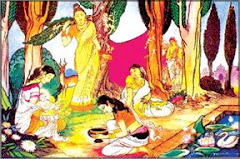
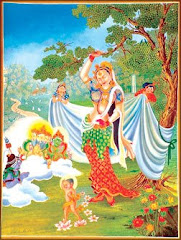
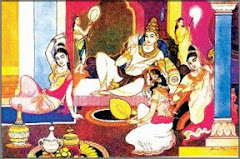

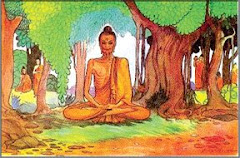



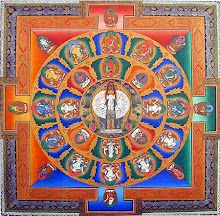
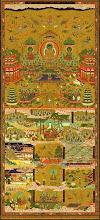
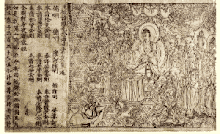
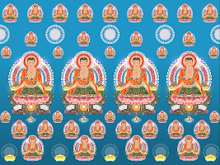

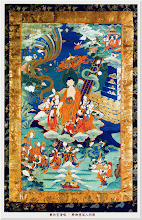

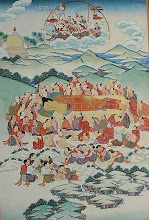


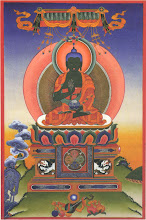




.jpg)

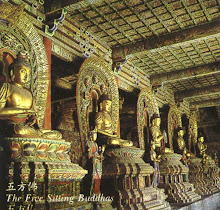

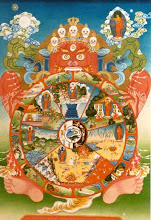


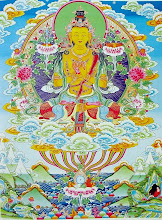
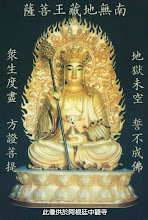

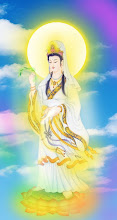
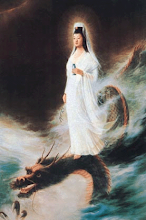
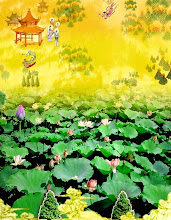



No comments:
Post a Comment